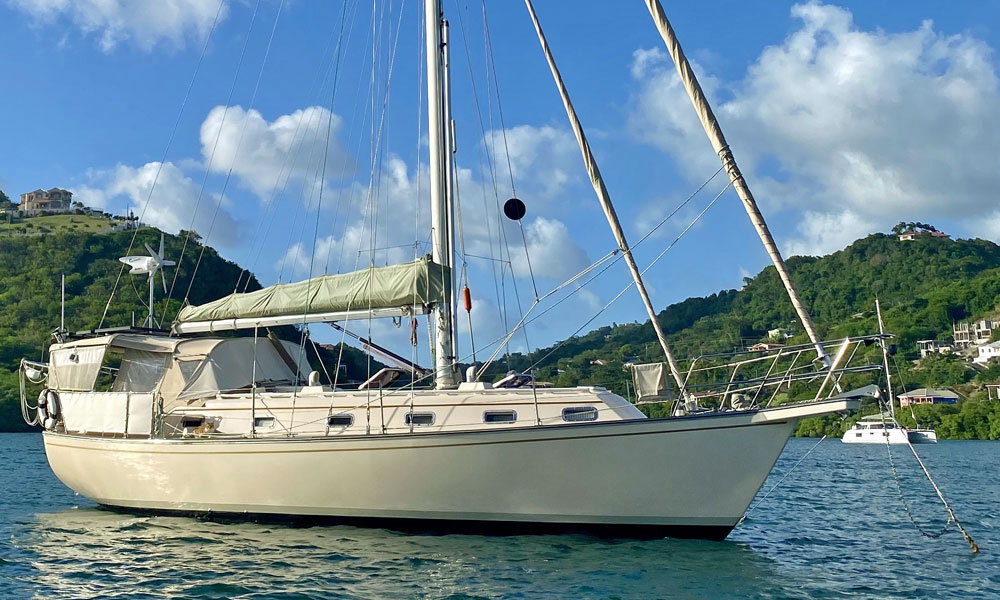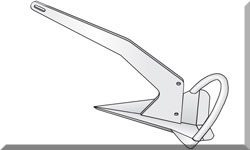- Home
- Buying a Used Sailboat
- Buying Direct from the Owner
Buying a Used Boat Direct from a Private Owner
A question we're often asked is:
"Are there any risks in buying a used boat direct from the Owner rather than through a Professional Yacht Broker?"
 The odds are, the seller is a perfectly honest and trustworthy individual, but as a buyer you should not take anything for granted...
The odds are, the seller is a perfectly honest and trustworthy individual, but as a buyer you should not take anything for granted...A very good question this, which arises as a result of sailboat-cruising.com providing a free platform for boat owners to advertise their boats for sale privately rather than paying for the services of a Professional Yacht Broker.
Clearly, as we make no charge for this service, this is a very attractive option for the Owner.
But what about anyone wanting to buy a boat though this free service? Would they be at risk?
The short answer is that they could be unless they take suitable measures to protect themselves.
The biggest mistake a Buyer can make is to part with any of his cash (yes, even a deposit) without a Legally Binding Agreement for the sale and purchase of a second-hand boat.
Without this document he will have no recourse against the previous owner, and he may find it difficult to provide provenance or proof of ownership when it's his turn to sell.
The Seller's and the Buyer's Different Aspirations and Objectives
Let's take a look first at the aspirations and objectives of the two main parties - the Seller (the current owner) and the Buyer (the potential new owner).
- The Seller will want to have his advertisement seen by as many potential buyers as possible, and will want to achieve a sale as close as possible to his asking price. He may well decide to hand all this over to a yacht broker and sit back and wait for his cheque, albeit of an amount somewhat less than the sale price due to the broker's commission.
- The Buyer will want proof that the Seller is the true owner, there are no undisclosed encumbrances associated with the vessel, and the vessel is as described by the Seller.
Enter the Yacht Broker, if the Seller has chosen to use one.
He, the Broker, will be motivated to sell the boat as quickly and pain-free as possible, pocket his commission and move on to the next deal.
Most importantly, the Broker will also want to maintain his reputation within the yacht brokerage industry—he will not want to be associated with the sale of a 'dodgy' boat.
The important thing to remember here is that the Broker works in the interests of the Seller—not the Buyer.
So, the brokerage contract is between the Seller and the Broker, but any ensuing Contract of Sale will be between the Seller and the Buyer—it will not involve the broker.
Consequently, there is no contractual relationship between the Buyer and the Broker.
But as a potential Buyer, there is something that you should be very much aware of...
Caveat Emptor - or 'Let the Buyer Beware'
Notwithstanding the existence of a viable Contract of Sale, it's the Buyer's responsibility to satisfy himself that the boat offered for sale accords with the Sellers description of it. If it doesn't, then the Buyer will find it very difficult to get any recourse from the Seller.
And we're not just talking about condition and equipment here. If a third party has a lien on the boat or the boat is subject to a writ, then the Buyer is liable for the discharge of these legally enforceable actions.
Similarly, if the boat is stolen or doesn't belong to the person purporting to be its owner, then he can lose the boat and any payments he has made against its purchase.
Buying a Used Boat Through a Yacht Broker
Whilst there's no contractual relationship between the Buyer and the Broker, there is a benefit in buying through a Broker. The Broker's reputation is hugely important to him—he most definitely won't want any prolonged post-sale hassle with a dissatisfied buyer.
Under the terms of a typical Broker's Contract of Sale, the Seller will have declared that...
"he is the [sole] legal and beneficial owner and has the right to transfer property in the boat and that the same is free from all encumbrances, mortgages, charges, liabilities for duties, taxes, debts, liens of any kind except those that are the responsibility of the Buyer"
... and the Broker will have proceeded with the transaction on the basis that this is in fact the case.
If it is subsequently clear that the Seller's declaration was untrue, then the Buyer will be rightly aggrieved and will seek redress under the contract. But if the Seller has vanished or is a 'man of straw' the Buyer will still be liable under 'caveat emptor'.
Now if I was the Buyer I would be mightily upset, and would let the Broker know (in no uncertain terms) that in my view he hadn't done his job properly. I might even mention the word 'misrepresentation' which should get his attention...
A reputable Broker will want to resolve this issue before the Buyer thinks about suing him through the courts.
Buying a Used Boat Direct from the Owner
Without the involvement of a Broker, the prospective buyer will have to make all the checks as to title, encumbrances etc, himself.
If the Buyer fails to do this and there is an issue down the line, then he's on his own - and could end up seriously out of pocket, have the boat taken from him - or both!
Of course, provided the Buyer has purchased the boat through a legally binding Contract of Sale as previously described, then he can sue the previous owner through the courts - a process unlikely to be inexpensive. This is all well and good if the previous 'owner' can be traced, but if he was acting in an intentionally fraudulent fashion then that may not be so easy.
But there is a further level of protection available for the Buyer...
And this is to employ the services of a Broker to facilitate the sale on your behalf. Now you, the Buyer, will have a contract with the Broker under which he will have to accept some degree of liability in establishing the veracity of the Seller.
This will involve a cost of course, but it may be worth every cent of it.
Recent Articles
-
Daily Current Draw Calculator
Sep 14, 25 04:30 AM
Calculate your Amperage Requirement with this Daily Current Draw Calculator and use this information in selecting the Appropriate Battery for your Boat -
The Ultimate Guide to Sailboats: Sloops, Ketches & More
Sep 11, 25 04:42 AM
A comprehensive guide to sailboat types. Learn the differences between monohulls and multihulls, sloops, cutters, ketches, yawls and schooners. -
Essential Sailing Knots & Splicing: The Ultimate Guide
Sep 11, 25 04:41 AM
Master essential sailing knots & splicing with our comprehensive guide. Learn their uses, history, and the anatomy of a perfect knot.












